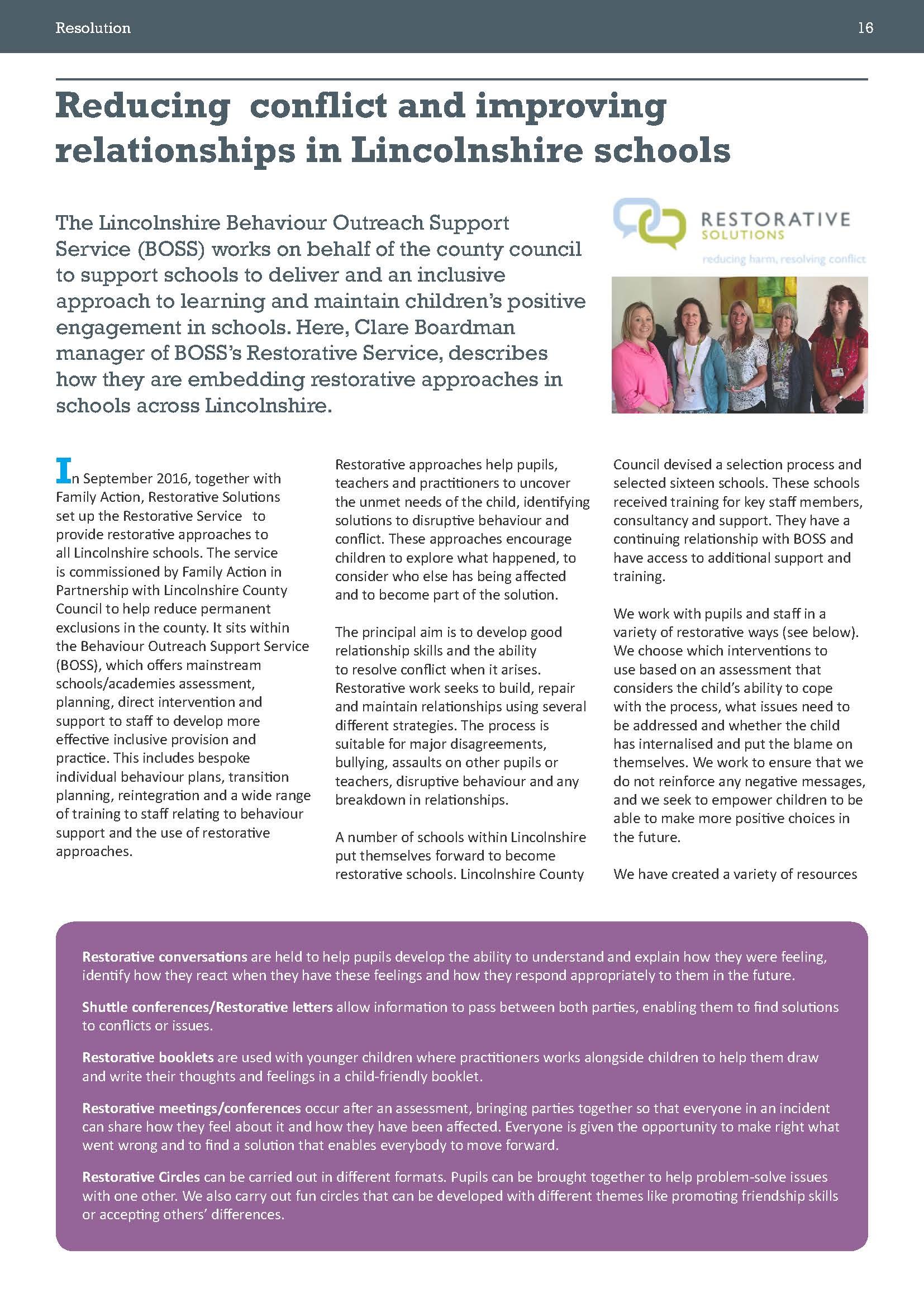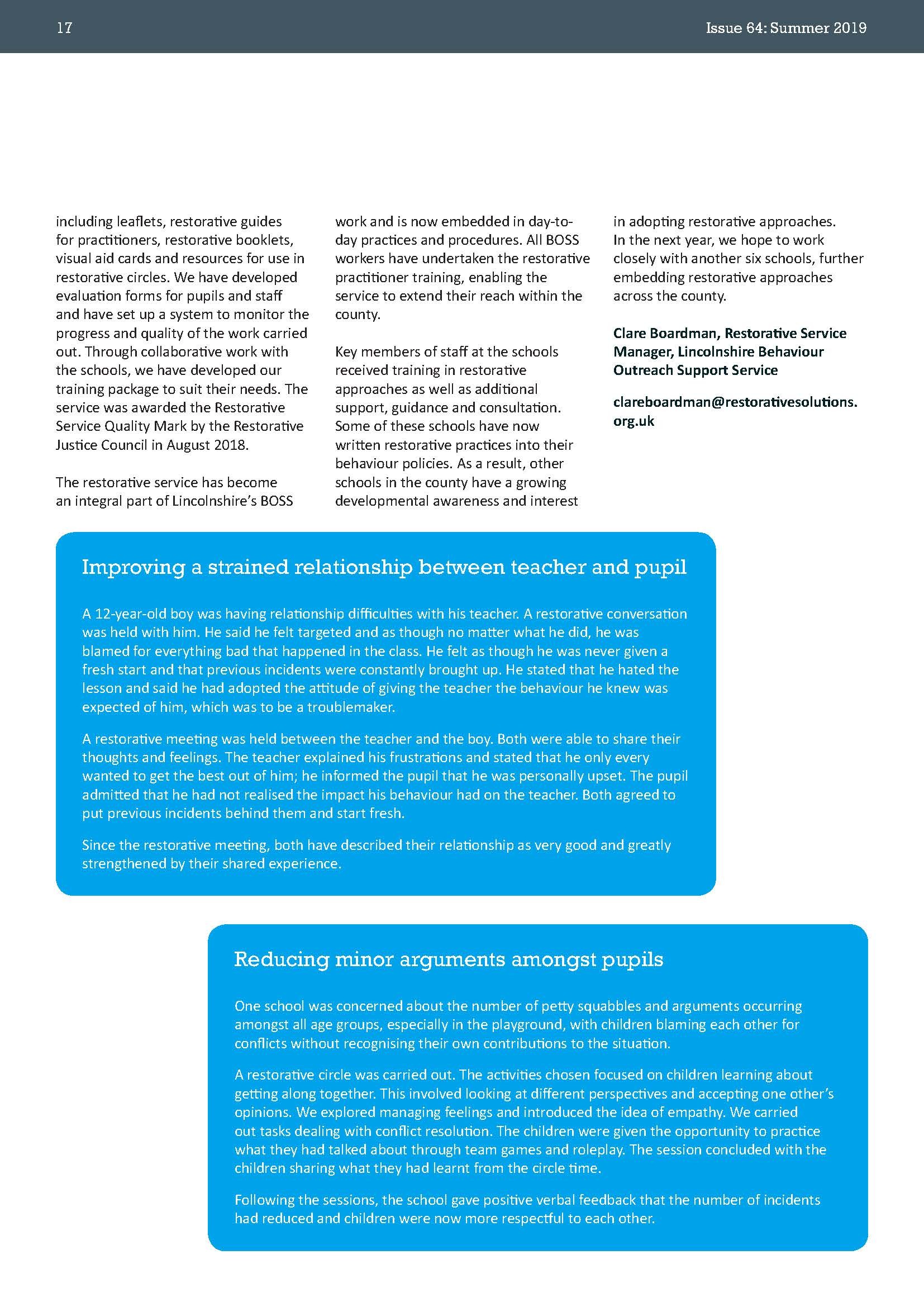Things to Consider Before Taking Part in Restorative Justice
While there are plenty of benefits to Restorative Justice, there are various things that need to be considered before ta...

In September 2016, Restorative Solutions together with Family Action set up the Restorative Service, to provide restorative approaches to all Lincolnshire schools. The service is commissioned by Family Action in Partnership with Lincolnshire County Council, to help reduce permanent exclusions in the county. The service sits within the Behaviour Outreach Support Service (BOSS), which offers mainstream schools/academies assessment, planning, direct intervention and support to staff to develop more effective inclusive provision and practice. This includes bespoke individual behaviour plans, planning transition, reintegration, and a wide range of staff training relating to behaviour support and the use of restorative approaches.
Restorative approaches help pupils, teachers, and practitioners to uncover the unmet needs of the child, allowing them to find a solution to disruptive behaviour and conflict being caused. They encourage the children to explore what happened, to consider who else has been affected, and to become part of the solution.
The principal aim is to develop good relationship skills and the ability to resolve conflict when it arises. Restorative work seeks to build, repair and maintain relationships using several different strategies. The process is suitable for major disagreements, bullying, assaults on another pupil or teacher, disruptive behaviour, and any breakdown in relationships.
A number of schools within Lincolnshire put themselves forward to become restorative schools. A selection process was devised by Lincolnshire County Council and sixteen schools were selected. Training of key staff members, consultancy and support were provided. There is a continuing relationship with BOSS and additional support and training is available to them.
We work with pupils and staff in a variety of restorative ways. The type of intervention used is based on an assessment which looks at the child’s ability to cope with the process; what issues need to be addressed; and whether the children have internalised and put the blame on themselves. We work to ensure that we do not reinforce any negative messages, and children are empowered to be able to make more positive choices in the future.
We have created a variety of resources including leaflets, restorative guides for the practitioners, restorative booklets, visual aid cards, and resources to be used in restorative circles. Evaluation forms have been developed for both pupils and staff and a system has been set up to monitor the progress and quality of the work carried out. Through collaborative work with the schools we have developed our training package to fit the needs of the schools we work with. The service was awarded the Restorative Service Quality Mark by the Restorative Justice Council in August 2018.
The restorative service became an integral part of Lincolnshire’s BOSS work and was embedded into day to day practice and procedures. All the BOSS workers have undertaken the restorative practitioner training, so the service was able to extend their reach within the county.
For the schools we are working with, restorative approaches training was provided to key members of staff plus additional support, guidance and consultation. Some of these schools have now written restorative practices into their behaviour policies. As a result there is a growing developmental awareness and interest in adopting this approach from other schools within the county. In the next year we hope to work closely with another 6 schools further embedding restorative approaches across the county.
Restorative conversations are held to help pupils develop the ability to understand and explain how they were feeling, identify how they react when they have these feelings, and how they respond appropriately to them in the future.
Shuttle conferences / restorative letters are where information is passed between both parties to find a solution to the conflict or issue.
Restorative booklets are used with younger children, where the practitioner works alongside the child so they can draw and write their thoughts and feelings in a child friendly booklet.
Restorative meetings/conferences are held after an assessment, where parties can be brought together and everyone involved in the incident can share how they are feeling about it, and how they have been affected. Everyone is given the opportunity to put right what went wrong, and to find a solution which enables everyone to move forward.
Restorative circles can be carried out in different formats. Pupils can be brought together to help problem solve issues with each other. We also carry out fun circles that can be developed with different themes, e.g. to promote friendship skills and acceptance of others’ differences.
Case Studies
Reducing minor arguments amongst pupils
One school was concerned about the number of petty squabbles and arguments occurring, amongst all age groups, especially in the playground, with children blaming each other but failing to recognise their own contribution to the situation.
A restorative circle was carried out. The activities chosen were focused on children learning about getting along together. These involved looking at different perspectives and accepting each other’s opinions. We explored managing feelings and introduced the idea of empathy. We carried out tasks dealing with conflict resolution. The children were given the opportunity to practice what they had talked about, using team games and role play. The session concluded with the children sharing what they had learnt from the circle time.
Following the sessions, the school gave positive, verbal feedback that the number of incidents had reduced and the children were now more respectful to each other.
Improving a strained relationship between teacher and pupil
A 12-year-old boy was having relationship difficulties with his teacher. A restorative conversation was held with him. He said he felt targeted and as though no matter what he did, he was blamed for anything that happened in the class. He felt as though he was never given a fresh start and that previous incidents were constantly brought up. He stated that he hated the lesson and that he had adopted the attitude of giving the teacher the behaviour he knew was expected of him, which was to be a troublemaker.
A restorative meeting was held between the teacher and the boy. Both were able to share their thoughts and feelings. The teacher explained his frustrations and stated that he only every wanted to get the best out of him and informed him that he was personally upset. The pupil admitted that he had not realised the impact his behaviour had on the teacher. Both agreed to a fresh start putting previous incidents to a side.
Since the restorative meeting, both have described their relationship as very good and greatly strengthened by their shared experience.
Clare Boardman, Restorative Service Manager, Lincolnshire Behaviour Outreach Support Service
clareboardman@restorativesolutions.org.uk


We’d love to talk to you about how we can find a solution for you.
I'm so glad I am working with Restorative Justice. I don't know who would listen to me if it wasn’t for you.
Restorative Justice is very underrated and I certainly think we should be using it more.
Very satisfied – it’s been a great service. A worthwhile process for me and I hope for the offenders. Staff have been great and I would like to thank them.
It was the right thing to do. Both victims told me to let go of what happened. I didn't want to hear it but they both forgave me and said I should move on. I have taken that on and thought about it and I have come to terms with what happened. You've helped me significantly. It's as though my head has been lifted of a gigantic weight.
Thanks for your time today. I feel like you understand R so well, I really hope you can help him to learn how to be happy.
Restorative Justice offers a unique opportunity for victims and survivors to move on from and overcome the trauma that can be left with them after experiencing crime. I am exceedingly proud of the work that the team at Restorative Solutions do in supporting our community. We should always consider the needs of victims of crime and this service exemplifies that sentiment and allows so many to put behind them what can be the worst experience of their lives.
This was a case of an overnight “creeper” burglary in a residential area where the harmer had gained access through an u...
The victim in this non-recent child sexual abuse case was a 56-year-old woman called Lisa. Her father sexually abused he...
This Restorative Justice case saw Jamie and Ruth openly communicate in a face-to-face conference. Years before, Jamie at...
We received a referral from a Victim Liaison Officer who was working on a manslaughter case. The grandmother advised the...
Nick worked at a clothing shop. When he noticed Glenn, a customer, shoplifting, Nick stepped in to challenge him. The po...
When Joanne and her husband had just gone to bed, they heard a really loud bang downstairs. They immediately thought som...
A young woman passed away after she was supplied Class A drugs. The person who supplied these drugs was convicted and se...
The offender in this case had been suffering with issues affecting his mental health which he tried to manage with alcoh...
The offender defrauded a woman he was in an intimate relationship with, stealing over £50,000 over a course of months. T...
The offender had sexually abused her young daughter, taking inappropriate photographs that were distributed to a third p...
This was a case where a family went through a restorative approach for their son who was displaying an increasing use of...
This was a case where one driver punched the wing mirror of another driver's car after his actions caused him to swerve ...
While there are plenty of benefits to Restorative Justice, there are various things that need to be considered before ta...
Practitioners are at the heart of the Restorative Justice process, facilitating communication between the victim and off...
Restorative Justice gives victims the opportunity to communicate with the person responsible for the crime that has affe...